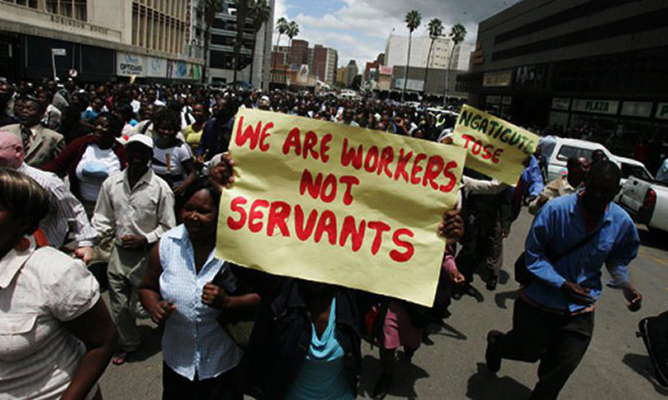
YESTERDAY, November 17, marked exactly three years when millions of Zimbabweans, most of them civil servants, marched in solidarity with the army after a coup, well packaged as an operation that your associates said was to restore legacy.
BY MOSES MATENGA
We were told, almost fooled, into believing that “criminals” around the late former President Robert Mugabe were exclusively responsible for the misery Zimbabwe found herself in then.
Now that the G40 cabal is out of the picture and their godfather, Mugabe is gone, it appears things are getting worse, especially for the civil servants who , in my humble view, have suffered the most since 2017.
Zimbabwe seems to be on a free-fall and, of course, the hardest hit are the government workers, a big number of them who marched for you in November 2017, supporting President Emmerson Mnangagwa’s comeback from momentary exile in South Africa after you were fired for “lacking probity”, whatever that meant.
That time a civil servant, the lowest paid was getting no less than US$520 and things were, although not perfect, better.
I remember how people were to later joke mocking each other for using $5 to have a scrumptious breakfast to go and remove Mugabe. Now, a yummy breakfast for a government worker remains a dream.
In fact, that kind of breakfast most of them had on their way to march for Mugabe’s removal could have been the last they enjoyed to date as things get tough. What is more concerning is your deafening silence on the plight of your workers.
- Chamisa under fire over US$120K donation
- Mavhunga puts DeMbare into Chibuku quarterfinals
- Pension funds bet on Cabora Bassa oilfields
- Councils defy govt fire tender directive
Keep Reading
More frightening even is the amount of terror unleashed on those who dare to exercise their democratic right to peacefully protest over poor working conditions. Remember how the police had to beat up striking nurses at the Sally Mugabe Central Hospital (formerly Harare Central Hospital) in May and embarrassingly arrested about 13 of them for “contravening COVID-19 regulations?”
Remember how doctors have also been threatened of late with authorities threatening to fire and replace them with military personnel.
Remember how a handful of doctors sheepishly turned up at the Munhumutapa offices boardroom for a date with Health minister Vice-President Constantino Chiwenga to apologise for their “behaviour”.
Those people had done nothing wrong, absolutely nothing.Their only transgression was to demand a better life befitting that of a doctor particularly in the dangerous COVID-19 times. At any given time, the civil servants are incapacitated and can, therefore, not go to work.
Teachers remain incapacitated no matter how your government has tried to give them allowances here and there. It is not enough, they say and their demand is in black and white.
They want the US$520 equivalent and instead of unleashing provincial education directors or any other local powers to deal with them, of course, looming large being the threat to fire them, is not the solution.
Mnangagwa’s silence on the plight of teachers has been deafening and in the few times he has scratched the subject up in his speeches, it has been a threat to the civil servants. These are the same people who have seen and read of corruption happening right under his nose, some of it implicating his wife, sons and relatives.
Even his security team has also been implicated and the narrative now is that the highest office are part of the rot. This kind of thinking can be pardoned as indications are that a connected clique is enjoying life in troubled Zimbabwe while the majority, most of them civil servants, continue to wallow in poverty.
Civil servants are suffering, and no country can prosper when the human resource that has the hardware and software to bring in good results is not happy. As a leader, it is time to take a stand and address, with less emotion, the plight of civil servants.











